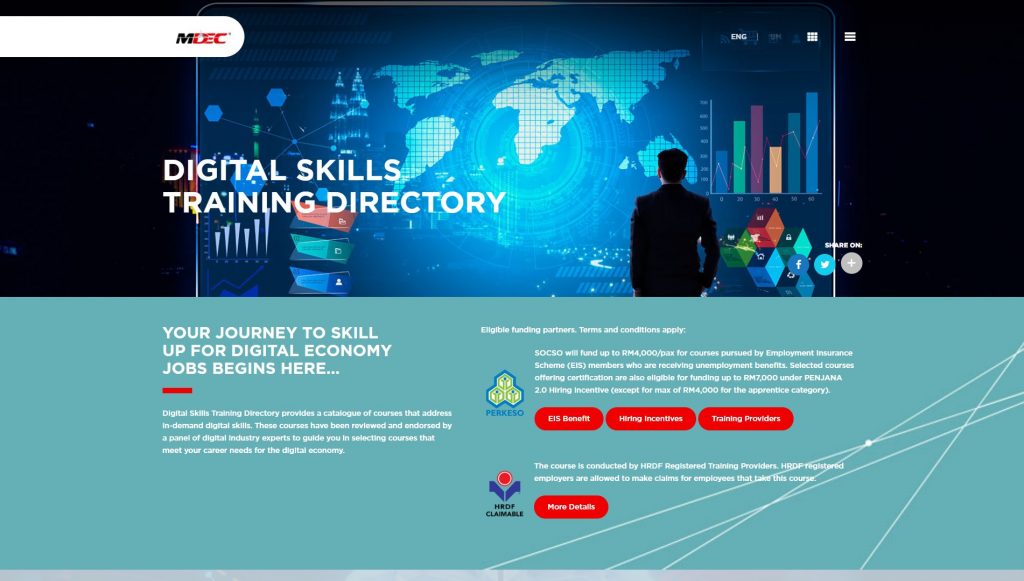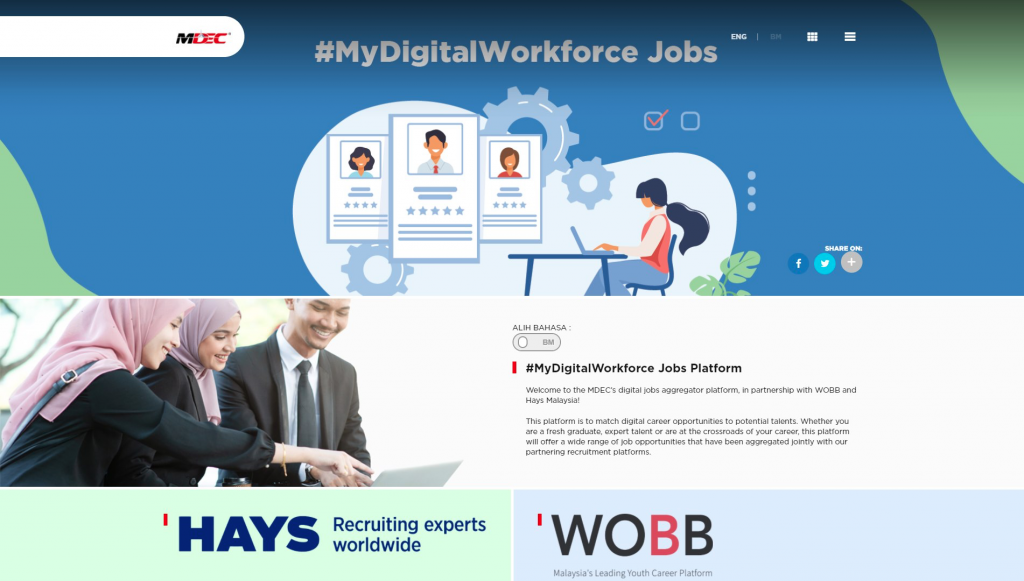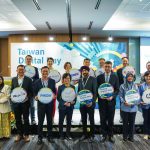Article written by: Dr Sumitra Nair, Vice President, Digital Skills and Jobs Division, Malaysia Digital Economy Corporation (MDEC)

As digital technologies have notably begun to play an even more critical role in the economy, it is increasingly clear that there is a real need to prepare talents – newly graduated or now in the workforce – for digital jobs.
More companies are becoming digital by default, with 91% of organisations having to adopt or have plans to become a ‘digital-first’ business strategy.
In fact, an average of $15.3 million over the next 12 months will be spent on digital initiatives, according to the IDG Digital Business Survey 2019.
The Department of Statistics Malaysia (DOSM) had revealed that small and medium-sized enterprises (SMEs) now comprises 48.4% of Malaysia’s employment and another similar report from Huawei revealed how 48% of SMEs recognise the lack digital skills.
In Malaysia, eight of the top ten emerging jobs will require digital tech skills. This includes jobs as Data Analysts and Scientists; Internet of Things (IoT) Specialists; Digital Transformation Specialists; and Cybersecurity Specialists, says the World Economic Forum (WEF)’s “The Future of Jobs Report 2020” Report.
The same study also forecasted that 50 percent of all employees will need re-skilling by 2025.
On the supply side, according to a 2018 Randstad survey, close to 90 percent of the workforce in Malaysia believe they do not have skills for a digital workplace, while graduate unemployment had also seen an increase due to the lack of digital skills.
The Ministry of Education Malaysia (MOE) Graduate Tracer Study 2018 states that 1 out of 5 graduates are unemployed and acquiring digital skills have been clearly acknowledged as part of the solution.
The question is “Do Malaysians have the right skills to survive and thrive in the digital economy?”
A Holistic Talent Pipeline to Face a K-shaped Economic Recovery
The Malaysia Digital Economy Corporation (MDEC) was quick to recognise the need for a holistic talent pipeline that serves to digitally up-skill Malaysians as the nation accelerates towards becoming a digital society.
A holistic approach is required, simply because digital literacy and skills is now a necessity at all strata and segments of society as the nation becomes increasingly digital by default.
From the future and emerging talent pipeline to underserved – rural communities, differently-abled and the lower B40 populace, to those looking for opportunities on an intricately landscaped suite of careers, all of them can only be filled via those who have specialised digital talents.
With these features, Malaysia’s particularly diverse workforce calls for opportunities being offered through a movement with spokes and hubs that reach out to each category of society that now constantly seeks digital upskilling through specific pipelines.
As is, the digital economy is expected to make significant contributions to the country as the projection is based on the forecasted economic growth rate of 6.7 percent next year, according to a World Bank Report and the significant contribution of 20 percent to the National GDP based on the Department of Statistics Malaysia report.
In this regard, MDEC, with the strong support of KKMM, will continue to drive forward the digital economy initiatives centred towards ensuring shared prosperity for the many and, eventually, envisioning Malaysia’s role as the heart of digital ASEAN.
All this will be guided mainly via its focus on three main strategic thrusts – empowering Malaysians with Digital Jobs and Skills; enabling Digitally-Powered Businesses; and attracting Digital Investments.
Various initiatives will follow through with the details outlined in the 2021 Budget as it ensures nation thrives in the Fourth Industrial Revolution (4IR) era and can make the concept of Malaysia 5.0 a success.
Building Talent Pipelines for Emerging Jobs
At one end of the talent spectrum that serves the future talent pipeline, movements such as MDEC’s #mydigitalmaker are aimed at cultivating digital innovation, creativity and problem-solving skills amongst Malaysian students.
In partnership with the MOE, the EdTech and Maker ecosystems, this movement had impacted more than 1.6 million school students nationwide.
Similarly, MDEC is also working with the Ministry of Higher Education (MOHE) and Premier Digital Tech Institutions (PDTIs) to ensure that industry-relevant content is integrated into the curricula of the 11 universities and 5 polytechnics that are in this programme.
More institutions of higher learning are joining this programme in 2021. The value of building a talent pipeline that cuts across the entire spectrum, starting with the next generation, is key in creating a resilient future workforce.
At the other end of the spectrum are those seeking employment through upskilling and reskilling digitally, for future jobs. MDEC’s COVID-19 Impact Survey 2020 revealed how 70% of Malaysian businesses will have retraining needs in a post-pandemic era.
A further 83% shared how the focuses would be in the areas of digital marketing and digital productivity tools, with the latter including remote working skills.
MDEC’s role in empowering Malaysians with digital skills
The need for digital up-skilling and re-skilling Malaysians had been evident throughout the COVID-19 pandemic. MDEC’s ongoing efforts include the most pronounced initiative under the still running #MyDigitalWorkforce Movement.
It launched in November 2020 during Malaysia Tech Month and brought Malaysians to a focal point that was populated with webinars, satellite events and a job expo that MDEC launched in August 2020 in response to COVID-19. The Movement itself had been dubbed the catalyst for talent to get on the K-shaped economic recovery.
Not merely fizzling out after the event ended, and with COVID-19 infection spiking over the last few months, MDEC also developed and introduced two new initiatives under the overall #MyDigitalWorkforce Movement.

Catered specifically to digital jobs- and skills-needs, both – MyDigitalWorkforce Jobs Platform and Digital Skills Training Directory – were launched simultaneously. These were the key enablers within the country’s efforts to help mitigate jobs impacted by the pandemic.

The digital jobs portal, an ongoing collaboration with recruitment firms – WOBB and Hays Malaysia, now offers more than 2,000 vacancies and career growth opportunities in jobs related to digital technology.
As for the Digital Skills Training Directory, MDEC introduced it in collaboration with SOCSO, with the latter providing an incentive subsidy under the SOCSO Employment Insurance Scheme. This is part of the PENJANA Hiring Incentive that offers up to RM4,000 per pax for unemployed Malaysians seeking to beef-up with new digital skills.
The directory is a catalogue of courses that address in-demand digital skills. These learning modules and trainers have been reviewed and endorsed by a panel of digital industry experts to ensure proper guidance is available to Malaysians who are selecting courses that meet the requirements for digital jobs.
Featuring 173 courses to-date, it comprises in-depth training and certification at beginner, intermediate and advanced levels in data sciences (50), cybersecurity (44), software development (55), animation (19) and game development (5).
Closing the Skills-Gap in the Digital Era
“As Malaysia, and the world, continue to contend with the disruptions that this pandemic had wrought, it’s now more critical than ever for the workforce to raise their game. This includes learning new skills and abilities that can meet the demands of the digital era.
The #MyDigitalWorkforce Jobs Platform and Digital Skills Training Directory is part our ongoing efforts to address the gap between talent fulfilment and workforce demands.
They are the necessary building blocks for Malaysia to kick-start and develop a digitally ready workforce. Only then can we truly accelerate ongoing efforts to grow the digital economy,” shared Surina Shukri, CEO, MDEC.
As of end-2020, the digital careers platform had received over 23,000 applications with almost 700 being shortlisted for interviews.
Similarly, the directory is now experiencing a surge in interest from youths, fresh graduates and the workforce. In fact, the number of applications and jobs continue to climb on a daily basis.
Today, the tech sector contributes 18.5 percent to Malaysia’s GDP – the highest in the region, and 30 percent to ASEAN’s Internet economy, making it truly the Heart of Digital ASEAN.
Talent is a crucial component in the nation’s digital ecosystem as digital competencies among these talents are catalysts for digitalisation across SMEs, industries and among the rakyat at large.
MDEC’s various digital economy initiatives are centred towards Digitally-Skilled Malaysians, Digitally Powered Businesses and Digital Investments – the three pillars under the agency’s strategic framework.
Among those parked under the Digitally-Skilled Malaysians are the #MyDigitalWorkforce Jobs Platform and Digital Skills Training Directory that aspires to address gaps between talent fulfilment and workforce demands via provisioning of strong digital competencies.
MDEC’s initiatives under the pillar of Digitally Skilled Malaysians have impacted more than 2 million Malaysians from the year 2016 to Q3 2020 as they help Malaysia accelerate its socio-economy towards becoming a digitally-skilled society and enable the nation to embrace the 4IR era as it steer towards achieving shared prosperity for all.
More details about MDEC’s Digital Skills Program are available at:
• #MyDigitalWorkforce Jobs Platform
• Digital Skills Training Directory
The views expressed here are those of the writer and do not necessarily reflect those of MARKETING Magazine.
(Photo credit: 123RF)
MARKETING Magazine is not responsible for the content of external sites.









